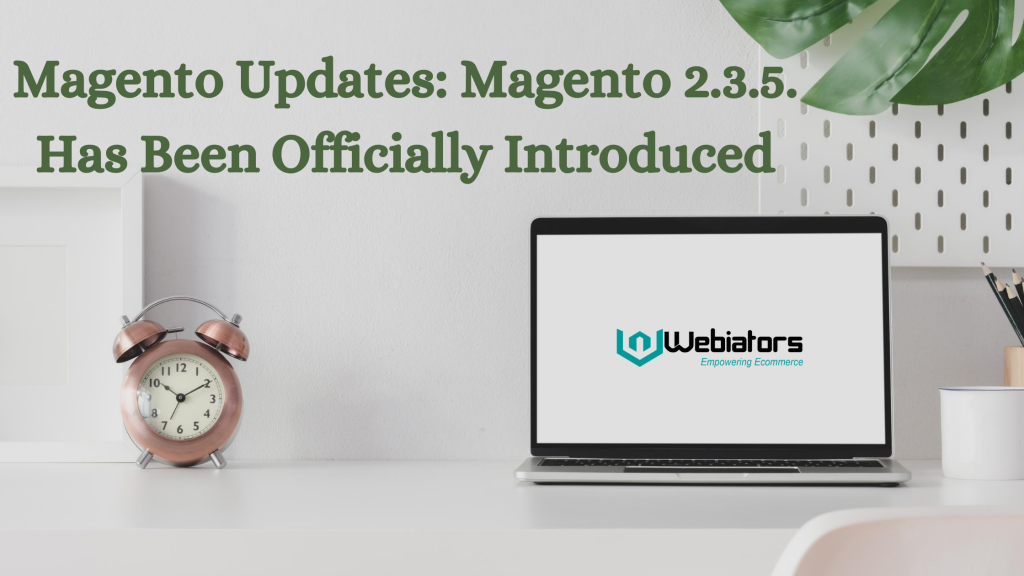
All Magento lovers eagerly await Magento updates for even better convenience, with new changes to Magento and increased use. The increasing use of the Internet has created a boom in online business, especially in ecommerce businesses. As everyone knows, Magento is the highest open source solution in the world of e-commerce. Therefore, a large community of developers who are working on this highest technology day by day, not only that, this community always provides some new and best facilities to the people as well as provides complete support.
Magento 2.3. After most of the Magento Lovers are eagerly waiting for Magento’s successor in 2020, so today through this post we are going to tell that the waiting of all those Magento developers is going to end today. Magento has officially released Magento 2.3.5 recently on 28 April 2020. In this post, we will tell you what is new in the latest version of Magento’s open-source that developers/Marchents should know.
The new version of Magento offers significant platform upgrades, performance improvements, and substantial security changes. The core product with Magento 2.3.5 includes over 25 security enhancements and over 180 functional improvements. Along with this latest version, more than 4 GitHub issues are being resolved by members of the Magento community. Not only this, it includes minor cleanup as well as much needed enhancements from core code to graphQL and inventory management.
The following improvements and fixes can be seen with this latest Magento version.
Platform upgrades:
The following platform upgrades help enhance website security and performance:
Support for Elasticsearch 7.5. Elasticsearch 7.5 is now the supported catalog search engine for both Magento Commerce and Magento Open Source. With this release, Magento 2.3.x supports only Elasticsearch 6.x and 7.x. Elasticsearch 2.x and 5.x are now deprecated for Magento 2.3.x and will be removed in Magento 2.4.0.
Deprecation of core integration of third-party payment methods. With this release, the integrations of the Authorize.Net, eWay, CyberSource, and Worldpay payment methods are deprecated. These core features are no longer be supported and will be removed in the next minor release (2.4.0). Merchants should migrate to the official extensions that are available on the Magento Marketplace. See the Deprecation of Magento core payment integrations dev blog post.
Deprecation of the core integration of the Signifyd fraud protection code. This core feature is no longer supported. Merchants should migrate to the Signifyd Fraud & Chargeback Protection extension that is available on Magento Marketplace.
Upgrade of Symfony Components to the latest lifetime support version (4.4). (Symfony Components are a set of decoupled PHP libraries used by the Magento Framework.
Migration of dependencies on Zend Framework to the Laminas project to reflect the transitioning of Zend Framework to the Linux Foundation’s Laminas Project. Zend Framework has been deprecated. Magento 2.3.5 contains the minimal number of changes to code and configuration that are required to support the use of the Laminas libraries. These changes are backward-compatible, and you can continue to use your current code. However, we recommend that extension developers and system integrators begin migrating their extensions to use Laminas. While this migration isn’t required for compatibility with this patch release, long-term solutions will require it.
Infrastructure improvements:
This release contains enhancements to core quality, which improve the quality of the Framework and these modules: catalog, sales, PayPal, Elasticsearch, Import, CMS, and B2B.
The PayPal Pro payment method now works as expected in the Chrome 80 browser. This payment method previously invoked a Magento callback endpoint that needed access to the customer’s session — access that the new default Chrome same-46 site cookie functionality does not permit. GitHub-26840
A PHPStan code analysis check has been integrated into Magento static builds. This tool performs sophisticated static code analysis and identifies additional issues that are currently not detected by PHP CodeSniffer and PHP Mess Detector. See Magento Testing Guide.
Merchant tool enhancements
Inventory Management
Inventory Management enhancements for this release include:
New bulk API for IsProductSalableForRequestedQtyInterface, which is used in checkout and cart verification
New extension point for SourceDataProvider and StockDataProvider
Ability to view allocated inventory sources from the Orders list
Performance boosts
Improvements to customer data section invalidation logic. This release introduces a new way of invalidating all customer sections data that avoids a known issue with local storage when custom sections.xml invalidations are active. (Previously, private content (local storage) was not correctly populated when you had a custom etc/frontend/sections.xml with action invalidations). See Private content.
Multiple optimizations to Redis performance. The enhancements minimize the number of queries to Redis that are performed on each Magento request. These optimizations include:
Decrease in size of network data transfers between Redis and Magento
Reduction in Redis’ consumption of CPU cycles by improving the adapter’s ability to automatically determine what needs to be loaded
Reduction in race conditions on Redis write operations
GraphQL
With this Magento 2.3.5 release, you can now use products and category List queries to retrieve information about products and categories that have been added to a staged campaign.

